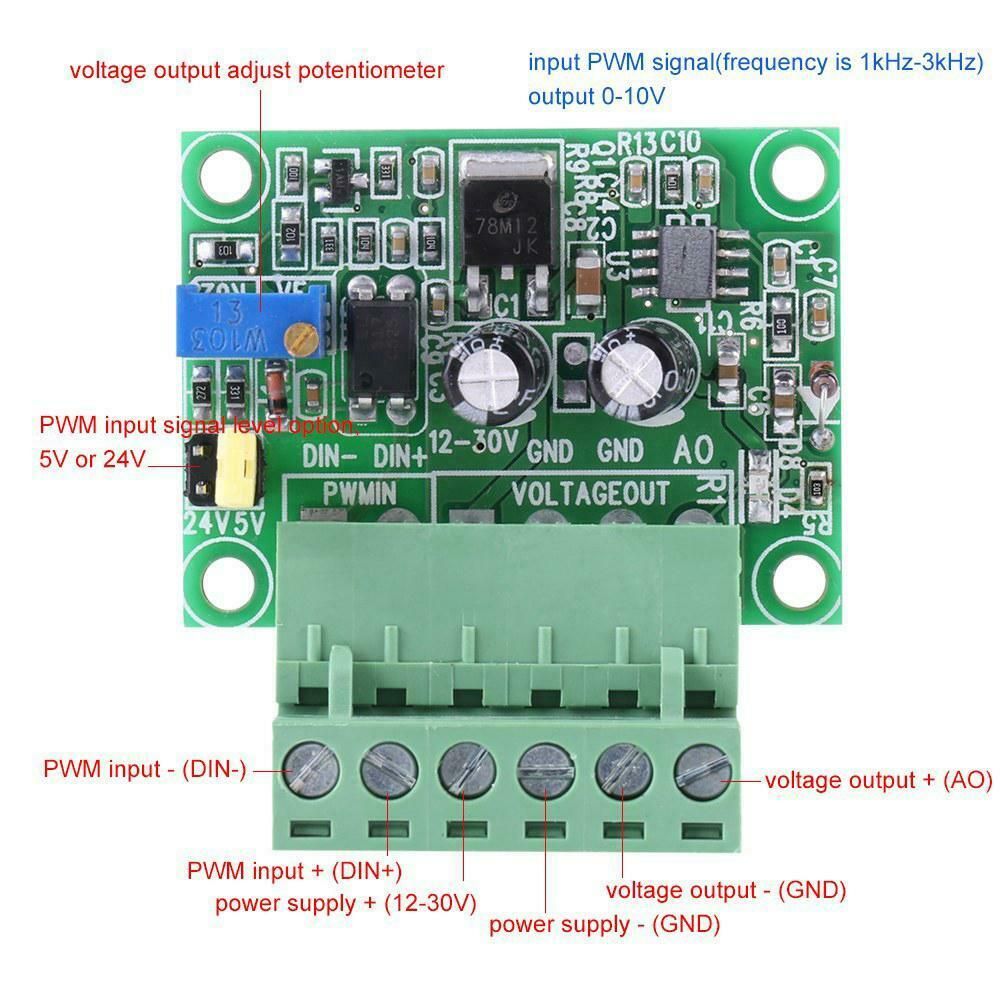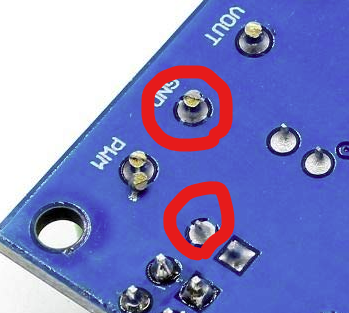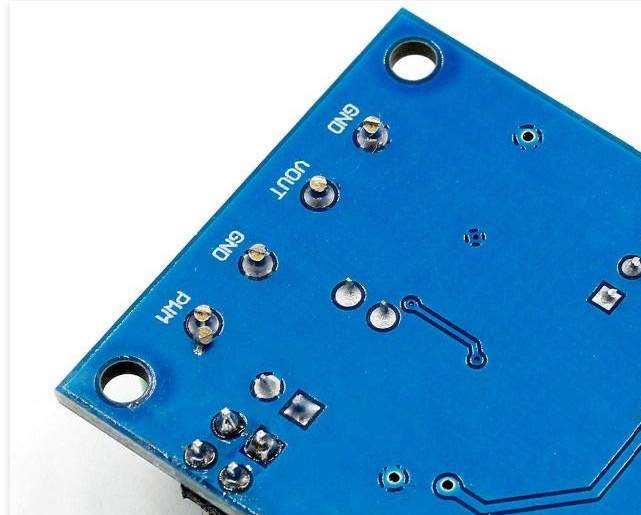PWM to 10V via e0heater always gives 10V
-
@larsw I would connect the PWM board like this:
VCC DC 12V-30V -> Duet VIN GND Ground. -> Duet Ground PWM Positive of PWM input signal. -> heater0 pin GND Negative of input signal. -> Duet Ground VOUT Output Voltage 0-10V. -> Analogue Output to spindle controller GND Output Voltage Ground -> Ground on the spindle controllerThen, you need a pullup resistor on the PWM input to the converter.
Connect a resistor in the range 2,000 to 10,000 Ohms from the PWM input on the converter to a 5 Volt pin on the Duet.You can add this resistor on the Duet between the heater0 pin and a 5 Volt pin right at the Duet.
-
@cjm:
The jumper is at 24V. I'm not sure exactly which pins you connect. I changed to below to use the names from the Duet 2 wifi board layout. This is how I have it connected.
VCC DC 12V-30V -> Duet VIN at DC powersupply - its 12,8V GND Ground. -> Duet GND at DC powersupply PWM Positive of PWM input signal. -> Heater VIN, it is 12,8V GND Negative of input signal. -> E0- VOUT Output Voltage 0-10V. -> Analogue Output GND Output Voltage Ground -> Duet GNDThis results in 10V output no matter M3 Sspeed
-
@alankilian I assume that heater0 pin is E0- ?
I have tried this - though without the pullup resistor,
It almost works - if I use !e0heat in the M950 command I can use the M3 command and adjust from 0 to almost 5V in output.The heater PWM is 12,8V - should this be connected with the pullup resistor to 5V, or was that a mistype?
-
On this device, when disconnected from anything else, can you check if there is continuity between the DC GND pin and the PWM GND pin?
Frederick
-
@larsw said in PWM to 10V via e0heater always gives 10V:
@alankilian I assume that heater0 pin is E0- ?
Yes.
The heater PWM is 12,8V - should this be connected with the pullup resistor to 5V, or was that a mistype?
It should be connected with a pullup to 5 Volts.
This is the PWM control input to the converter and it's designed to be driven from a microcontroller, so it's input range is 0 to 5 Volts according to what I can get out of the data sheet you linked to in your first post.
Does anyone know what "Fengfeng value" might mean" I'm not hitting anything on the google machine.
-
@fcwilt said in PWM to 10V via e0heater always gives 10V:
On this device, when disconnected from anything else, can you check if there is continuity between the DC GND pin and the PWM GND pin?
Frederick
I just measured and can confirm this.
-
@alankilian said in PWM to 10V via e0heater always gives 10V:
@larsw said in PWM to 10V via e0heater always gives 10V:
It should be connected with a pullup to 5 Volts.This is the PWM control input to the converter and it's designed to be driven from a microcontroller, so it's input range is 0 to 5 Volts according to what I can get out of the data sheet you linked to in your first post.
Actually no - the converter has two PWM input modes - 4,5V to 10V or 12V to 24V. Selectable by a jumper (The documentation calls this a jump needle - had me quite confused). I have jumped it for 12-24V.
Does anyone know what "Fengfeng value" might mean" I'm not hitting anything on the google machine.
Nice to know I was not the only one.. Fengfeng value means peak value. That also took me quite a while to get translated.
-
@larsw said in PWM to 10V via e0heater always gives 10V:
Actually no - the converter has two PWM input modes - 4,5V to 10V or 12V to 24V. Selectable by a jumper (The documentation calls this a jump needle - had me quite confused). I have jumped it for 12-24V.
OK, that's cool. I was getting confused by the data sheet and couldn't quite get that information from it.
Then you can just pull up to the heater supply voltage.
-
@alankilian Perfect. Still same resistor range?
-
@larsw Yes, the pullup resistor value is not critical at all.
i generally use 4.7 KOhms for a quickly changing signal (like this) and a 47 KOhm for slowly changing signals like switches.
-
@larsw Understood - and the reason this is not working is because the "Negative of the PWM input signal" is connected to Ground as you measured and confirmed in your answer to @fcwilt. This is unlike other similar boards where both positive and negative PWM inputs are fully isolated from ground, in which case this connection works fine.
However, with your board, @alankilian's approach is a good one.
-
@cjm Fantastic - I'll try this in the weekend when I get my hands on the machine again.
-
@larsw A point to note is that if the photos of your converter board on the web are correct, it uses an opto-isolator with a choice of two series resistor values (selected by the jumpers) to match either 5V or 12V-24V.
The pull-up resistor used in @alankilian’s approach is in series with the opto-isolator’s input resistor and so has to have a low enough value to pass sufficient current to turn on the opto-isolator.
The 2K or 4K values mentioned by @alankilian connected to the heater supply voltage should be fine.
However, some opto-isolators have low efficiency so, if you find you’re not getting reliable results, you might want to try setting the board’s jumper to 5V mode.
-
@cjm I agree, from the photo it appears that it has an opto isolator for the input. So why is there continuity between the PWM input ground and the output ground?
-
-
@larsw I tried to use a similar type for an older CNC controller of mine and didn't have any luck. I eventually found and used this type which worked:

Available from the usual places. -
As a side note, this board reminds me of a similar project by egon.net https://forum.duet3d.com/topic/21680/designing-a-pwm-to-analog-mini-board-for-fans
-
@cjm I tried the pull resistor (4.7k) and it worked perfectly.
Only issue now is, that the 0-10V output max'es out at 8.6V, but I read somewhare that the converter - even though the specs says VIN 12V to 24V needs least 14,6V to reach 10V in output signal, and my powersupply is 12,8V.
8,6V is close enough - my spindle reaches to max speed at 9V.
-
@alankilian they've made a mistake with that design IMO, by sharing the ground plane with both ground pins even though the input is optically isolated.
I would be tempted to cut the 4 fingers that join each of the pins I have marked to the ground plane, and connect them together with a wire instead.

-
@larsw said in PWM to 10V via e0heater always gives 10V:
@cjm I tried the pull resistor (4.7k) and it worked perfectly.
Only issue now is, that the 0-10V output max'es out at 8.6V, but I read somewhare that the converter - even though the specs says VIN 12V to 24V needs least 14,6V to reach 10V in output signal, and my powersupply is 12,8V.
8,6V is close enough - my spindle reaches to max speed at 9V.
That's GREAT news!
Thanks for keeping up with our ideas and letting us know you got it working.
If you want to get to 9 Volts, you can try adjusting the potentiometer on the board.
